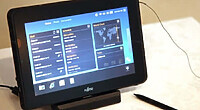The easiest way that most thought can salvage the PlayBook tablet device out of its impending graveyard was to allow the device to run Android Apps. Their native application market just did not have enough to attract developers to it. A user would therefore have limited applications to load on the PlayBook for their various needs. RIM accepted this suggestion and went ahead to provide for Android App compatibility on the PlayBook. However, while that is a welcome change for an otherwise brilliant tablet device, the various limitations that RIM had put in place as a pre-requisite for the PlayBook to run Android Apps has led to more questions than answers.
Like the recent announcement from RIM that the PlayBook won’t run Android apps that are supported by advertisements had led many to doubt if such a move can indeed save the PlayBook from fizzling out. RIM though has stepped in to clear the air and have stated the ads can run inside of Android apps though developers have been barred from using RIM’s own BlackBerry Ad services in their bid to monetize their apps.
Another sore point for developers who wish to port their apps on to the PlayBook is that they will have to do without in-app purchases. What this means is that developers either have to make available their apps completely free or for a price, either of which isn’t just the most appealing thing for the developers to opt for.
RIM had earlier announced applications that have an advertisement attached to it will not be allowed to run on the PlayBook. Developers who have developed some application and not charging the user for their effort, and rather collecting revenue from a company whose content they link to via their app, becomes a banned item for the PlayBook. RIM would surely find this restrictive clause playing against them, but as of now Playbook OS 2.0, the new OS for the PlayBook with Android App compatibility has this restriction in place.
RIM though has stated all of this won’t have too serious an effect of the PlayBook and is rather buoyed by the strong positive response that developers has evinced in creating apps for the PlayBook. As many as 6,600 developers have registered in just 6 days prompting RIM to extent the procurement process. Of course, there is also the free PlayBook offer for developers to go for.
“While Android is important to fill out the long tail of apps, the focus is on building out native and HTML5 apps,” said Jeff Gadway, RIM’s Senior Brand & Marketing Communication.
The PlayBook had its greatest limitation in the incapability to access messenger as well as calendar without it being connected to a BlackBerry Phone in real time. The Playbook 2.0 OS is supposed to correct these errors. It may have some new interest amongst gadget users.
Meanwhile in another interesting development, native Twitter and Amazon Kindle app might soon be seen making its debut on the PlayBook.
As per the Best Buy Canada’s product page: “Plug in to BlackBerry App World™ and read, write and game like never before. With thousands of apps for every use, you’ll never run out of new and exciting options. Pick up Angry Birds or Cut the Rope, read the latest magazines, or connect online with Facebook and Twitter apps. With access to Kobo and Kindle, you can enjoy new late night reading without ever leaving your living room.”
What’s not known though is when the Twitter and Amazon Kindle apps will be seen on the PlayBook device.
via gigaom
With a keen interest in tech, I make it a point to keep myself updated on the latest developments in technology and gadgets. That includes smartphones or tablet devices but stretches to even AI and self-driven automobiles, the latter being my latest fad. Besides writing, I like watching videos, reading, listening to music, or experimenting with different recipes. The motion picture is another aspect that interests me a lot, and I'll likely make a film sometime in the future.

